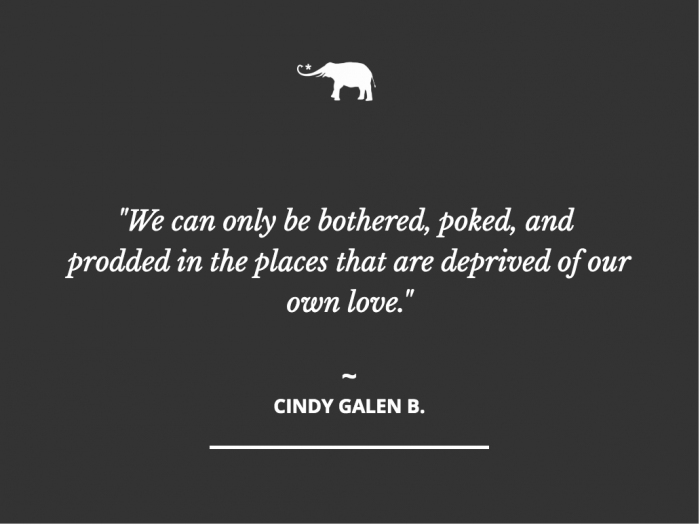I wondered if she knew I was dead inside—that I’d disconnected from her to save myself from feeling anything.
We hugged goodbye on the street, like old friends do. I saw the cars passing and felt the heat of her arms around me, but nothing else registered. I smiled the deceptive smile I’ve worn a thousand times before. The one that held back my tears and said I was fine, all was well, despite the lump building upon itself in my throat.
I suppose it was the backhanded compliments, her condescending tone, and the snide look she made with her eyes that had me check myself out. Or it could just be that her standing in judgement over me was palpable in the air. The aroma of her disapproval and the scent of nonacceptance created a harshness—all of its own.
I felt as if she was poking deeply into the most fragile and wounded parts of me with a sharp stick.
Being criticized, defamed, demoralized, or demeaned to some degree, and at some point in our life, it is inescapable. The hope is that our personal experiences have granted us empathy, the ability to self-reflect, and the emotional intelligence to rise above the inclination to degrade another.
But judgement comes in the heat of the moment, sometimes beyond awareness and best intentions. And other times, it is purposeful, a systematic belittling that unconsciously has us project our own internal pain onto another—a defensive coping mechanism. Oftentimes, it appears that those who stand above us are reveling in the sense of power, superiority, and popularity they derive from our disempowerment.
For years, I thought I needed to toughen up and stand up for myself. I believed I needed to quit crying and learn to face intolerance head-on. I’ve read countless self-help books on the matter. I’d taken assertiveness classes and implemented strong boundaries.
And still, my insides always crashed and burned when I felt unfairly judged or sharply criticized.
But when I learned to view harsh judgement as energy, I realized it isn’t so much about defending myself, nor is it necessarily about power, status, or social standing. It’s about remembering that what I am responding to is only energy. Sure, there may be lessons in the experience, but not all of it is for me or about me.
Judgement, from this perspective, is the attraction to a quality that lives within someone or something. We crave and desire this quality for our own or we are repulsed by it. And, in both cases, our attraction will draw us toward this quality like a magnet.
Our fascination has the potential to bring out our highest and best or our lowest and worst selves. We can become inspired and enlightened. We may write songs and books about this quality and infuse it into our everyday lives. Or, we can become envious and threatened, despising and ridiculing the people we see it within.
We can sense another’s attraction to an essence within us. We feel welcomed and sense the adoration when it’s a positive charge—or we are left feeling rejected when it’s a negative charge, sometimes without a clear understanding.
And we can become emotionally reactive when we feel shunned.
We may unravel, lose ourselves, and question our own worthiness.
We may try to dull the parts within us that make us the envy or ire of others—shame ourselves into conformity.
We may spend countless hours analyzing, trying to comprehend “why”—consumed by another’s judgmental nature.
Once we learn that criticism and judgement resonate energetically as a loss of love, we can deal with the loss itself and stop reaching for the love that is being withheld. The truth is, whenever we meet another with love and acceptance and it isn’t reciprocated, or worse, we are met with animus, it hurts. We need to validate our hurt feelings and allow ourselves to feel our sadness.
But we don’t need to understand another’s reasoning or their motives for withholding affection. And we mustn’t lose ourselves in their commentary or try tirelessly to win them over.
We can inquire what this loss of love represents for us and what it is reminiscent of in our lives. When we make room to grieve our losses, we give ourselves permission to feel, learn, and move on.
We can remind ourselves that we can only be bothered, poked, and prodded in the places that are deprived of our own love.
Our soft, wounded places don’t need to remain fragile or shameful. We can embrace and heal whatever has been perceived as disgraceful. We can turn our attention inward and meet our softness with love and absolute acceptance.
We can focus on the positive energy that is attracted to us. We can decide to shine with those who are shining with us.
We can come to a place where another’s judgement doesn’t feel reflective of us or have any bearing on our worth.
It becomes just someone else’s energy.
~









Read 20 comments and reply